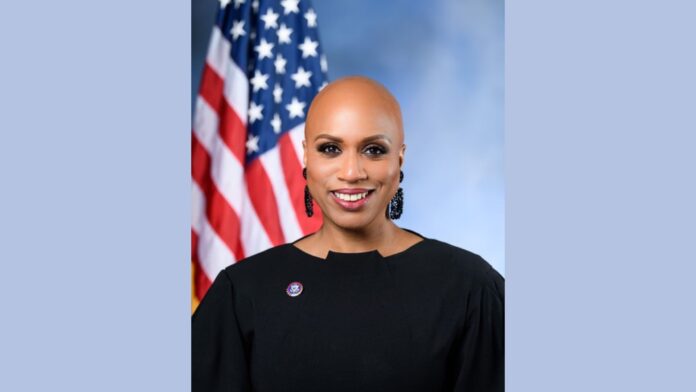Hot on the heels of the recent Fight Book Bans Act, on Dec. 14 freshman Congressperson Ayanna Pressley (D-Mass.) introduced the Books Save Lives Act. The four-part legislation, HR6830, is one of the first to directly address book bans on a national level. She announced the introduction of the bill at a press conference at the Library of Congress.
Speaking on the House floor when introducing the bill, Pressley described how Maya Angelou’s “I Know Why the Caged Bird Sings” helped her conquer the sexual abuse she faced as a child.
“It was the first time in my life I knew I was not alone and it helped me move forward,” she said. “So when I say that books save lives, I mean that.”
In a statement to the public, subsequently published on her website, Pressley said, “Rather than honor the brilliance and diversity of our authors, illustrators and librarians, Republicans are focused on further marginalizing people who already face systemic discrimination in our society — including people of color, the LGBTQ+ community, religious minorities, and people with disabilities — through discriminatory book bans. The Books Save Lives Act pushes back on this dangerous trend and reaffirms the need for representative literature by ensuring libraries nationwide maintain a diverse collection of books and classifying book bans as violations of federal civil rights laws.”
As of its introduction, the bill has 27 co-sponsors, all Democrats, and is supported by such groups as We Need Diverse Books, PFLAG, Florida Freedom to Read, and Colors of Change, among others.
The bill calls for the following for all school and public libraries that receive federal funding:
- Ensure primary and secondary schools have a library with a trained librarian
- Require public libraries and school libraries to maintain a diverse collection of books
- Classify discriminatory book bans as violations of federal civil rights laws
- Direct the Government Accountability Office to report on the effect of book bans on underrepresented communities.
In accordance with congressional procedure, the bill was referred to the House Committee on Education and the Workforce and the Committee on the Judiciary.
According to reports published by PEN America, book bans have been on the rise in recent years. During the 2022-2023 school year, more than 3,000 books were banned — a 33% increase from the previous school year. Book bans overwhelmingly apply to books that directly address issues of race and racism, have LGBTQ+ themes or have protagonists or prominent secondary characters of color or who identify as LGBTQ+. The bans have largely come from Republican politicians, conservative school boards, and so-called “parents’ rights” groups, such as Moms for Liberty that have opposed such content as “woke indoctrination” that’s “age-inappropriate” or “pornographic” for school children.
Pressley’s legislation is not the first bill to be introduced in an effort to counter book bans. In April, Rep. Raúl Grijalva (D-Ariz.) and Sen. Jack Reed (D-R.I.) introduced the Right to Read Act. Then, just this month, a coalition of Democrats led by Rep. Maxwell Frost (D-Fla.) unveiled the Fight Book Bans Act, of which Pressley is a co-sponsor. Of the 27 original co-sponsors of the Books Save Lives Act, only one was from Pennsylvania: Summer Lee (Dist. 12), who also co-sponsored the Fight Book Bans Act.
Subsequent to her press conference, Pressley participated in a discussion group on the issue of book bans with PEN America’s Kasey Meehan and Laura Schroeder along with writers and organizations including the Florida Freedom to Read Project, We Need Diverse Books, Human Rights Watch, National Council of Teachers of English, Comic Book Legal Defense Fund, PFLAG and the American Libraries Association.
During the discussion, Kasey Meehan, Freedom to Read program director at PEN America, said, “Over the last few years, across the United States, we have witnessed alarming attacks on free expression, particularly the freedom to read. These attacks rely on authoritarian tactics of fear, intimidation and silencing — straining and fostering mistrust in our public schools, and undermining our schools, educators and librarians’ ability to meet their goals of educating students with knowledge and critical thinking and facilitating the ongoing unification that undergirds a pluralistic society.”
